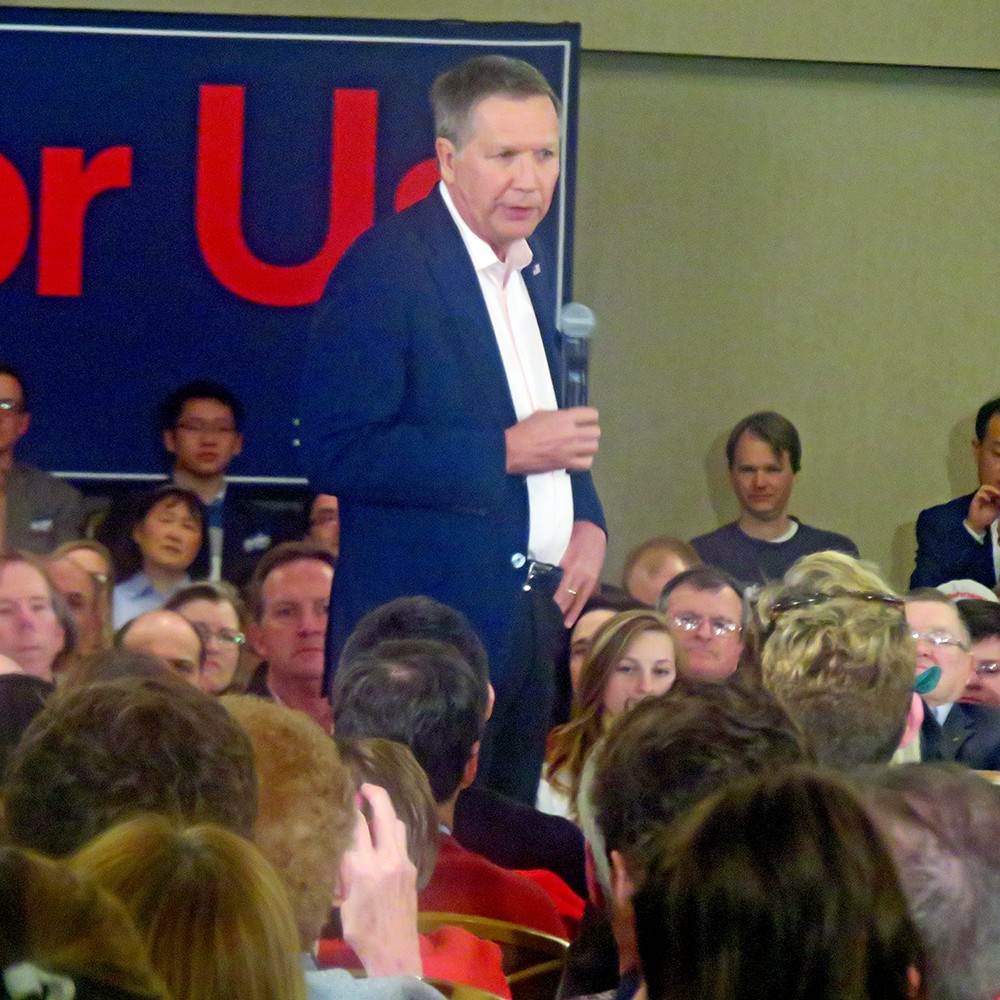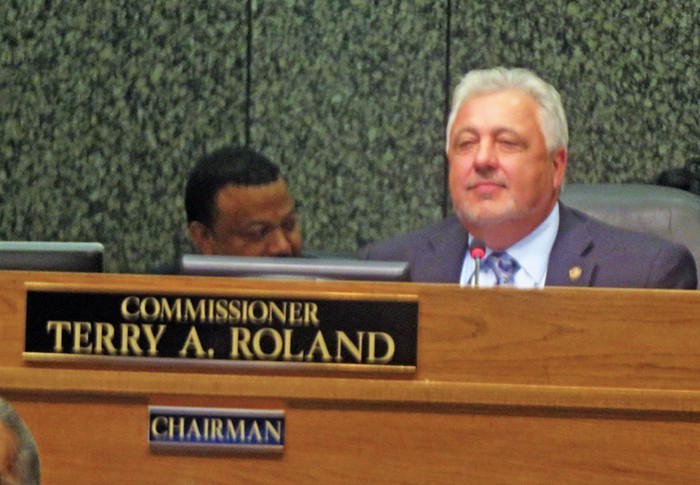 JB
JB
Kasich in the round at Holiday Inn
Governor John Kasich, the Governor of Ohio and one of five contestants left standing in the race for the 2016 Republican presidential nomination, came to Memphis on Friday night — a day before the presumed GOP frontrunner, Donald Trump, two days before Dr. Ben Carson, pretty much an also-ran at this point, and four days before Tennessee and a dozen other states vote on Super Tuesday.
After arriving roughly an hour past his 6 p.m. start time due to a flight delay and being introduced by local Republican eminence Brad Martin, Kasich spoke before a crowd of some 700 packed into the ballroom of the Holiday Inn on Central Avenue and then indulged the gathered media with an availability in a nearby private room of the hotel.
The Kasich who spoke to the ballroom multitude was essentially a more sustained dose of the same Kasich who has become a familiar presence in the series of GOP debates on TV — straightforward, friendly, experienced, non-abrasive, and logical, with just the right degree of tongue-in-cheek attitude and ingratiating manner.
There was a wink in his voice when he spoke of having just experienced a “demolition derby” (presumably the rowdy WWE-style debate on CNN Thursday night in which candidates Marco Rubio and Ted Cruz ganged up on Trump) and of “how great it was” to remain “an adult in the room.”
The crowd rewarded that with applause, and Kasich continued: “You know, the way I think you win an election is, you talk about who you are, what you’ve accomplished, and what your mission is. I don’t think it’s about getting down and wrestling in the mud.”
Whereupon the Governor dilated a little bit on who he was and what his mission was.
This Kasich can run through the political check-list in such a way as to leave the party conservatives in the room happy while suggesting to the independents and Democrats he’s their kind of guy, too.
As an example, when, during a Q and A Kasich was asked by an audience member to dilate on “Obamacare” (a.k.a. the Affordable Care Act), his answer conformed to the standard Republican catechism — the Act had raised rates and deductibles too high and needed to be replaced — but he said so without any of the usual accusatory fuming and bombast favored by his primary opponents.
Kasich duly, and with evident sincerity, vowed that no citizen should be left without medical care. And when he spoke of his alternative — a system of exchanges to vend insurance alternatives for most people and Medicaid for the poor — he made it all sound remarkably like… Obamacare.
And, asked about the Second Amendment, he endorsed it without bluster and segued neatly into a compassionate plea for dealing systematically with the mental illness he saw as being common to the perpetrators of gun violence.
He spoke of his “dirt-poor” childhood in a blue-collar Pittsburgh suburb and of his mailman father who would celebrate the successes of the people on his route and cry with them over their sorrows and who, with his mother, would be killed by a drunk driver. He related all this to the anxieties of people in today’s world but leavened the sad tales and Norman Rockwell tableaus with spunky stuff like the story of how, as a college freshman at Ohio State, he hustled his way into, first, an audience with the president of the University, and then, remarkably, with the then-serving President of the U.S., Richard Nixon.
“For the young people here, keep pushing until somebody tells you no. That’s what life is,” Kasich advised, going on to lament that, after 18 years in Congress, he’d peaked out on his time in the Oval Office with those 20 minutes he got back then.
Besides being extraordinary in its own right, that story (which was illustrated in a recent TV bio-clip which, indeed, showed the gawky young teen being greeted by Nixon) has a parallel of sorts in the long-odds challenge Kasich faces in his current endeavor to get into the Oval Office on his own.
Despite Kasich’s high-water finish of second place to Trump in the New Hampshire primary, most pundits look at his single- and low-double-digit standing in other polls and primaries and couple him with the beatifically irrelevant Ben Carson as mere adjuncts to the three-man slugfest featuring Trump and the battling Mambo brothers, Senators Marco Rubio and Ted Cruz.
But, as his artful courtship of the Holiday Inn crowd Thursday night indicated, with his chameleon-like way of hitting the ideological middle on subjects ranging from drug treatment to educational enhancement to job programs, and with a still-boyish charm that easily co-exists with a professional manner and convincing résumé of gubernatorial achievement, Kasich has managed to make the case for himself as an alternative to the ego-trippers and slicks and bully boys of this presidential race.
This Kasich can and does (and did) kiss babies. But there is another Kasich, too, a scratchier one that the media got to see in the post-event availability.
It should be noted, for what it’s worth, that the Governor is among those candidates (Trump is another) who will pause, during his remarks to a crowd, to sweep his arm — accusingly? boastfully? or both? — in the direction of the attendant media folks on their riser, usually in the rear of the venue, as if to say (and sometimes to actually say), ‘There they are!’ (The rascals!) Hello, Dr. Heisenberg.
In any case, right away during his availability, Kassich was probed at some length for a response to the sensation of the day, an endorsement of Trump by New Jersey governor Chris Christie, who was forced out of the race after a poor showing in New Hampshire but still presumably maintains some cred.
Kasich allowed as how yes, he was disappointed and, yes, he had hoped that he, not Trump would get the nod from Christie, and that yes, he had even asked his fellow governor for it. But he developed something of an edge as questioning of that sort went on and nearly lost it when a reporter asked too insistently that he reveal the name of a forthcoming luminary that he’d hinted would be endorsing his own candidacy. (See video clip at bottom of page.)
(On Saturday, the Kasich campaign would announce endorsements from former G.W. Bush-era Attorney General Alberto Gonzales and former New Jersey Governor Christie Whitman. Could that have been who? Really? Cue Miss Peggy Lee.)
The last question at the media availability, which pre-supposed that the punditocracy was correct in presuming that the jig was up for his chances, got a little further under his skin and scarcely improved Kasich’s mood. But in his curt response to that, the Governor made it clear that, to his mind, he had just begun to fight and that he would, for example, pick up a handsome passel of votes in the winner-take-all primary in Ohio, two weeks hence. Count on it.
Maybe, as some present must have thought, this was just a man going through the denial phase of coping with oncoming misfortune. But maybe, too, this harder edge that was now showing through (and banishing any residual hint of Eddie Haskell courtiership) was a sign that, if and when Kasich does get to be the last obstacle for, say, a Trump or Rubio to overcome, he won’t be found wanting for the fight.
Meanwhile, The Donald himself will be here on Friday, in Millington. The show goes on, and there are rumors of a mystery guest.
Kasich, Kicking Off a Candidate Weekend Here, Hits the Ideological Middle
